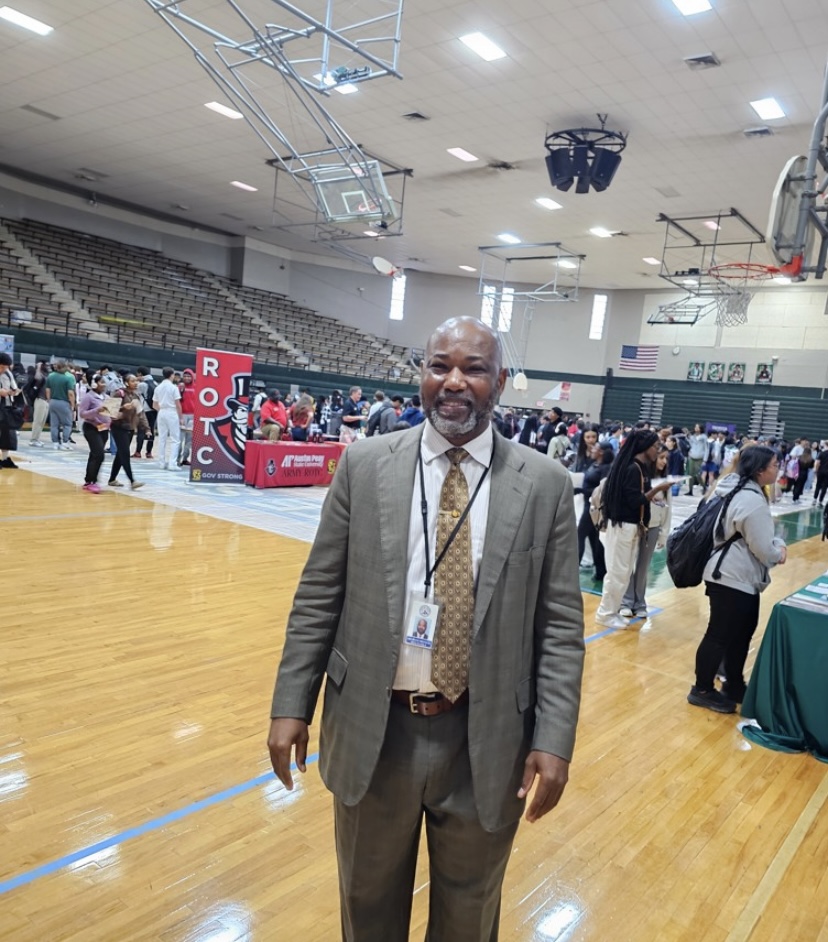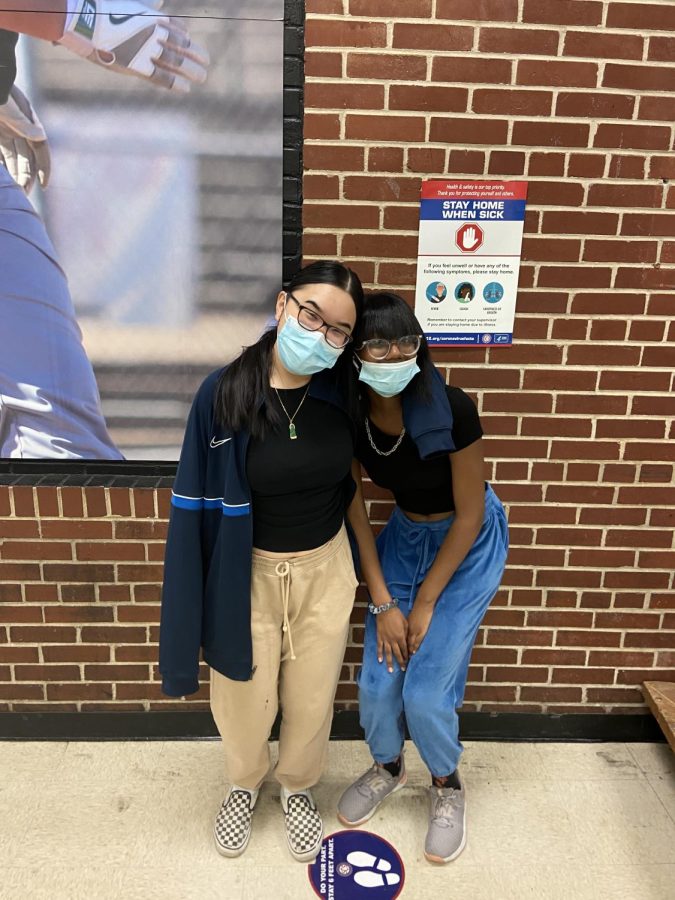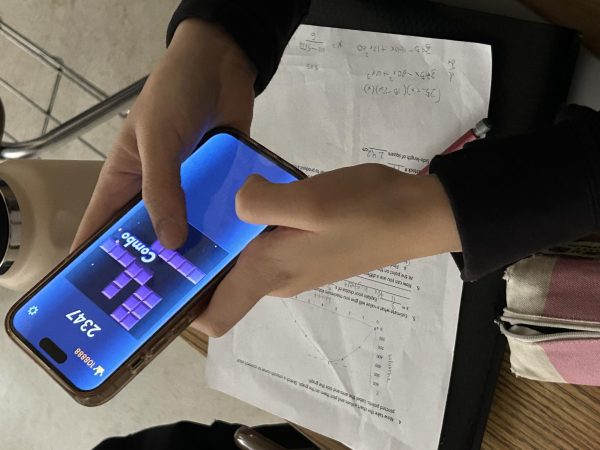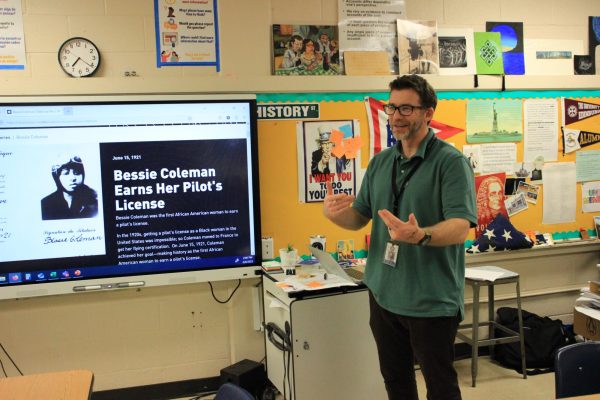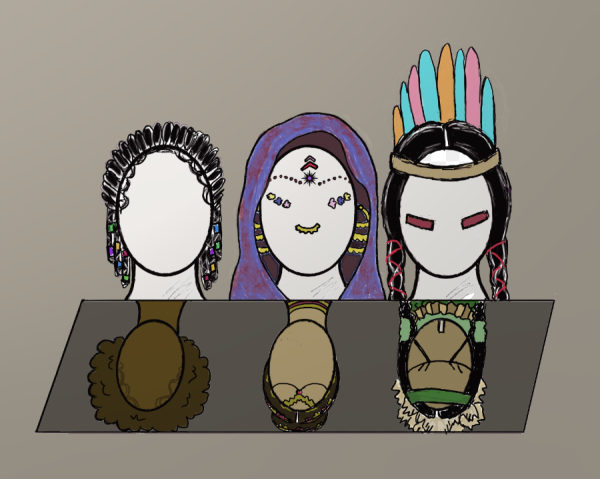White Station students navigate divide between traditional and optional programs
While the traditional and optional programs have many differences, students from each can still come together to enjoy various activities during and after school. Kathy Lam (11) and Macaya Wright (11) maintain a close friendship despite coming from two different programs.
Two kids. Best friends. All through elementary and middle school, they shared everything — time, secrets, a few test answers. But as they entered high school, one thing stood between them: optional and traditional. Where they used to see each other every day, now they only see each other in passing; a few afterschool get-togethers, but eventually their friendship faded into each passing year. While this is not the story for every student at White Station, it is the unfortunate reality for many.
One key problem many students remark upon is the divide between students in the traditional and optional programs. While each program aptly prepares students for the world after high school, they also seem to keep students within their own spheres of interaction, both traditional and optional students remarking that they often have little communication with those in the other program.
“I definitely think there is a divide [because] I think there’s just not that much time for interactions between [the two programs],” Shaniya Thomas (11) said. “Once you’re in the optional program, the only people you really interact with are [in the] optional program. It’s just there’s no time or no opportunities where you get to. Unless you’re taking traditional classes, there’s no time to meet them or talk to them.”
This disconnect between traditional and optional has often led to misconceptions surrounding those in the opposite program. The important thing to recognize, however, is that each individual has a different story and different aspirations — no matter what program they enroll in at White Station.
“Honors classes [and Advanced Placement (AP)] classes are definitely not bad; they’re good for you especially when you go to college,” Ralph Macasias (11) said. “I take traditional classes, which is not a bad option either, so don’t let … people [in] honors or AP classes bring you down because you take traditional classes. You’ll make it where you can make it.”
Some students also feel that traditional teachers use this label as an excuse to dedicate less effort to instruction, which may account for the misconception that traditional students learn less. Overall, it depends on the teacher, optional or traditional, to ensure that a student is receiving the best education possible.
“It’s the teacher’s job to help students that are struggling and encourage them because right now, traditional classes feel like an excuse for teachers to be laid back and not be passionate to help the students learn,” Kathy Lam (11) said. “The teacher should be able to be really passionate with teaching regardless of what levels students are in because I still feel like I learn so many things from traditional classes only because of the teacher.”
One common misconception is that traditional classes contain less content and that the coursework is less rigorous. The material in these courses is often the same — just at a modified workload to better suit students in their available time and effort.
“I have some friends from optional, and sometimes we do the same homework, same classwork, same tests, and I [think] ‘What? What are you taking honors classes for if it’s the same thing?’” Macasias said. “I don’t really see that much benefit from [honors], especially because there’s not much difference — a few more questions or a few less notes, but that’s not going to do anything.”
Each level, while teaching students information they can use in college or in the workplace, is simultaneously preparing them for standardized testing. The same concept applies in this field as well — traditional classes, while often misperceived, are said to ready students just as effectively as honors.
“Honestly, traditional classes prepare you just as well because the ACT is a content based test, and a lot of times your AP classes are based on that subject matter — like AP Biology is not going to be on the ACT … where Algebra II, Geometry and some of those classes: that’s what the ACT is all about, so you’re getting that same content no matter what level of math you’re taking,” school counselor Leslie Fleming said. “So you’re still going to get prepared to have the score that you want.”
Many students in the optional and traditional program feel the same pressures of college admissions looming, and this concern can sometimes lead to a difficult climate of comparison for students at all levels, especially surrounding their scores on standardized tests. One of the greatest frustrations for some is the diminishing of one’s above average scores because of the nature of competition at White Station.
“It sometimes feels like people with high scores rub it in on other people, which can cause a lot of problems,” Lam said. “People that make low scores often begin to compare and label themselves as unintelligent [and] might feel like they’re not qualified to be good enough as others’ friends. I feel like class separation starts with comparison and labeling each other as smart or not smart, and people begin to surround themselves with people that make the same scores.”
The competitive arena for standardized testing and college admissions, in general, seems to be an element that affects both traditional and optional in different waves. While many appreciate the extra nudge it gives them, others feel that sometimes this competition pushes them to feel negatively about themselves and their own abilities.
“I say [competition] is a double-edged sword — it is very motivational, but then, it also makes people take classes and do things that aren’t necessarily in their best interest,” Fleming said. “It’s just like everything else. Competition can be great and then sometimes it’s not quite as great.”
The most important factor to remember is that high school is not the end of the line — people can be successful no matter what classes they take as long as they work hard despite how natural competition can be. A school divided can stand because these differences are what makes White Station a unique place to learn.
“I think each person has a different goal and what they want to get out of their education, and not everyone wants to pursue something that’s very, very academic,” Thomas said. “That’s something that’s just personally my goal, and I feel like by taking [AP] classes I’m preparing myself for that, but that’s not necessarily everyone’s goal, and so I don’t think that everyone should have to take all these hard classes or take these challenging course if they feel like they don’t need it.”
Your donation will support the student journalists of White Station High School. Your contribution will allow us to purchase equipment and cover our annual website hosting costs.










